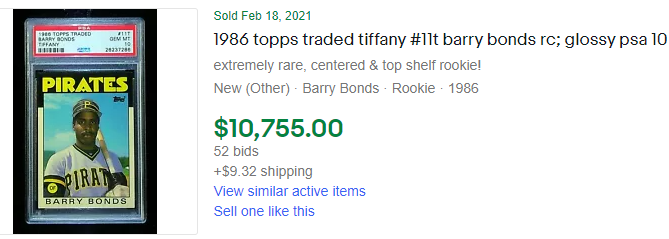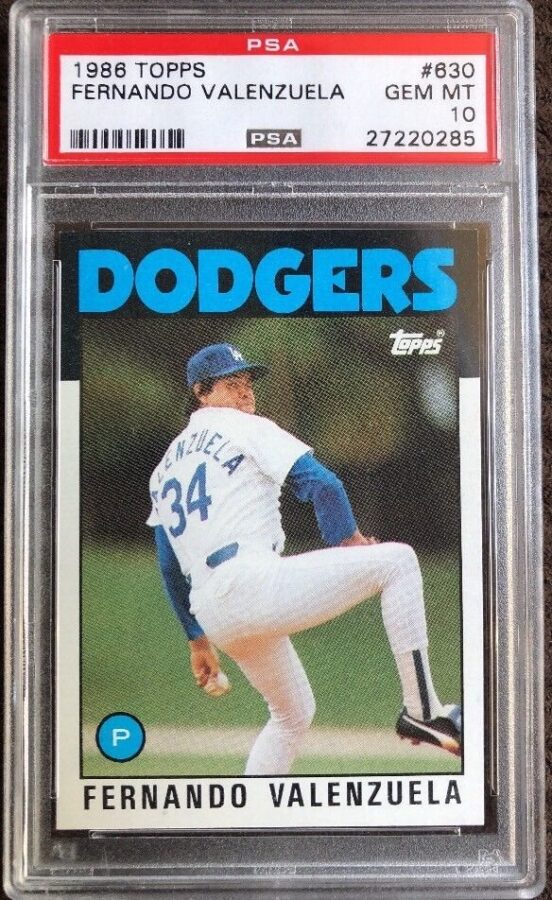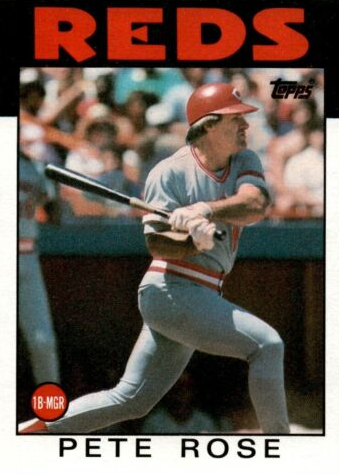You might remember the 1986 Topps baseball cards as plain, boring, or ugly. I remember them as marking a transition in baseball where a new era began, and the game reclaimed its status as a national pastime.
New baseball stars were breaking through and ready to move into the spotlight by 1986.
The stage was set for the next generation of super-athletes to captivate fans and take the game to the next level.
The 1986 season would conclude with one of the most improbable endings to a World Series in the history of the game.
The title would go to The Big Apple where the Mets would help ignite buzz and excitement sending the message that baseball was back.

Topps Baseball Cards
Baseball cards in the 1980s were relatively simple compared to the current landscape of the industry.
The early 1980s included only a few card brands, and Topps was the most recognized. Of course, there was also Fleer, Donruss, and late in the decade, Upper Deck, but Topps was the standard.
Morris Shorin
The Topps baseball card maker’s roots date all the way back to 1890 when Morris Shorin started a company called American Leaf Tobacco.
During World War I, the company had difficulty with its tobacco supplied from Turkey.
Later, the Great Depression of the 1930s would impact the company’s sales. Shorin had four sons, Abram, Ira, Joseph, and Philip, who would refocus the company on chewing gum.
Tops in the Industry
The four brothers formed Topps in 1938, with the goal of becoming “tops” in their industry.
After finding success with their Bazooka bubble gum, the Shorin brothers attempted to increase sales at Topps by packaging their gum with trading cards in 1950.
The first rendition included the Western character Hopalong Cassidy, one of the biggest T.V. stars at the time.
Sy Berger
With the Hopalong Cassidy vintage trading cards’ success, Topps realized it would be wise to expand on the concept. Sy Berger, a 28-year-old Topps employee, was tasked with designing the now-famous 1952 Topps cards.
The rest is history, as they say. The 1952 Topps set featured the Mickey Mantle card, now valued at over $3 million. Sy Berger would go on to work at Topps for over 50 years.
Baseball in Transition
The game of baseball is always going through phases. Baseball cards are no different.
The 60s and 70s had their ups and downs for the sports card market, but Topps continued with their yearly sets. When the 1980s rolled around, baseball was dealing with a few popularity issues. The strike in 1981 hurt baseball’s image.
It also needed to replace the game’s huge personas from previous decades that weren’t around anymore.
Names like Aaron, Clemente, Mays, and Mantle, these players were now retired. And the new stars of the early 80s were just more soft-spoken than, say, a Reggie Jackson-type character.
Robin Yount, Tony Gwynn, Ryne Sandberg, Dale Murphy were great players but would not be considered outspoken in the least bit.
Eddie Murray, Rod Carew, Andre Dawson, Cal Ripken Jr., and Ozzie Smith, more great players but lacking in superstar qualities that would captivate audiences like a Mantle or Willie Mays.
1986 Topps Baseball Cards
I don’t think anyone would say there was a baseball card craze in 1986, but card collecting was gaining some momentum, much like the game itself.
I would consider the 1986 Topps baseball cards to mark a turning point in both baseball cards and baseball’s popularity overall.

Some of the greatest players of all time had their rookie seasons right around this time. Bo Jackson, Barry Bonds, Roger Clemens, Mark McGwire, Jose Canseco.
These were future superstars who would leave their mark on the game, in one way or another, forever. And with personalities larger than life to attract fans back to baseball.
1986 Topps Baseball Wax Pack
In 1986, a wax pack of Topps baseball cards cost .35 cents. That equals roughly $13 bucks for an entire wax box of 86′ Topps.
One surprisingly enjoyable thing is to watch videos of card collectors opening old wax packs.
Check out the video below. In the second pack, he nails a handful of the best mint cards from this set. You can also get a sense of what it was like opening wax packs with a piece of gum in each pack, insert and stuck to a card.
The guy goes through all 36 packs in the wax box. If you’ve ever collected 1986 Topps baseball cards, this video will definitely bring back a lot of memories.
The Best Cards From The 1986 Topps Set
Not only did 1986 mark a turning point for baseball, but it perfectly marked the year that several new baseball stars would have their rookie cards unleashed on the card collecting world.
Soon, the newly crowned superstars would ignite a baseball card collecting craze America has never seen before.
1986 Topps Bo Jackson
I can easily make the case that Bo Jackson is the greatest athlete ever to play professional sports. It’s almost not even a discussion at this point. He’s a legend in every sense.
And the 1986 Topps Traded Tiffany Bo Jackson rookie card might be my personal all-time favorite card. Right up there with the 1989 Upper Deck Ken Griffey Jr.
I don’t need to run down Bo’s career stats, highlights, and accomplishments to make people understand what type of athlete he was; most people already know.
The Greatest Athlete of All-Time
In fact, his famous marketing campaign for Nike was such a success. People started to think “Bo Knows” just about everything. The 1986 Topps Bo Jackson card was the start.

Baseball fans talked about Vincent Edward “Bo” Jackson from the time he was playing in high school. If you read Bo’s book, Bo Knows Bo; he was actually a legend in his own neighborhood when he was about 5 years old.
I read the book, and if half the stuff in the book is true, Bo is undoubtedly the most amazing athlete ever to live.
One of the most anticipated debuts of a baseball player occurred in Kansas City in late September of 1986.
His first at-bat was an infield single, where he beat the throw from second base and showed his blazing speed.
You can tell by the crowd’s reaction that the anticipation for Bo had been building for months, if not years.
1986 Topps Barry Bonds
Barry Bonds might be the Rodney Dangerfield of baseball; he gets no respect. And by no respect, I’m saying his 1986 Topps Traded Tiffany rookie card has only recently started to sell for good money.
The most recent sales of 1986 Topps Barry Bonds in PSA 9 condition have been right around $1,500.
The Greatest Hitter of All-Time
Allow me to remind you that the guy has 762 career home runs, more than any other person ever to play major league baseball. Bonds has hit about 230 more home runs than Mickey Mantle – if that means anything to you.

And before you mention the performance enhancements that Bonds might have indulged in, let me say that maybe half the pitchers he faced were also roided out of their minds.
Do you really think Harmon Killebrew could have handled a 102-mile-per-hour fastball from Eric Gagne?
The 1986 Topps Traded Tiffany Barry Bonds rookie card deserves some respect. Respect for the player, the home runs, and the swagger that Bonds would demonstrate for the next 21 years after this card was printed.
It’s the premier card from perhaps the greatest hitter of all-time. ( * )
1986 Topps Roger Clemens
There was a time when Roger Clemens was the most feared pitcher in the world. Nobody wanted to face him. They wanted no part of The Rocket.
The 1986 Topps Roger Clemens was not his rookie card, but it was the year Roger became “The Rocket.”
After getting drafted 19th overall in the 1983 MLB draft by the Boston Red Sox, Clemens soared through the minor leagues’ ranks. Only one year after being drafted, he made his major league debut on May 15th, 1984.
The Rocket
At the start of the 1986 season, Clemens did something no other pitcher in history had done. He stuck out 20 hitters in a nine-inning game against the Seattle Mariners.
He would go on to win the American League MVP in 1986 with a 24-4 record and 238 strikeouts.

There are plenty more incredible Roger Clemens achievements to mention. Some would say his legacy is tarnished by the controversy of the steroid era and other incidents that may or may not have happened over his life.
But one thing is clear; the 1986 Topps Roger Clemens card marks the moment when The Rocket was born.
Topps Baseball Cards Value
There were other notable 1986 Topps baseball cards such as the Eric Davis, Nolan Ryan, and Andre Dawson card. Ryne Sandberg, George Brett, Keith Hernandez, and Rickey Henderson were also included in the Topps set.
Don Mattingly, Dwight Gooden, Pete Rose, Will Clark, and Carlton Fisk all had 1986 Topps baseball cards.

The 1986 Topps baseball cards were packed with future Hall of Fame players.
If you remember trading these cards as kids, they will always be incredibly nostalgic, even though the card’s actual design is perhaps one of the most boring layouts in baseball card history.
It turns out these cards are historically significant after all.
Topps 1986 Complete Set Values

The sealed 1986 Topps baseball factory sets still hold valuable, especially if it’s the Tiffany and Traded versions. Topps card wax packs are also valuable if you can somehow authenticate the packs are still factory sealed.
1986 Topps baseball cards will live in infamy as marking the beginning of many eras to come.
Fernandomania
One of my personal favorite cards from the 1986 Topps Baseball card set is the Fernando Valenzuela #630.
It’s not the most valuable card around, but the player on the card transformed the game from 1981 to 1986.
Almost the instant of being called up to the Majors to pitch in the last month of the season in 1980 for the Los Angeles Dodgers, “Fernandomaina” swept through the countryside.
Pitching out of the bullpen, Valenzuela pitches 17 2/3 scoreless innings and helped his Dodgers team tie the Houston Astros for the National League Western Division lead.
After losing the one-game playoff game to the Astros, the season was over, but “Fernandomaina” had just begun.
Valenzuela drew huge crowds to Dodger Stadium the following year. He would achieve a rare feat – win the Rookie of the Year Award and the Cy Young award in 1981, the first player ever to win both awards in the same season.

For the next six seasons, Fernando dominated. During the 1986 All-Star game, he stuck out five straight hitters, tying a record set by Carl Hubbell in 1934.
He was also one of the most feared pitchers to grab a bat. Valenzuela hit 10 career home runs and was even used as a pinch hitter from time to time. In 2003, he was inducted into the Hispanic Heritage Baseball Hall of Fame.
Hall of Fame 1986 Topps Baseball Cards
Other players printed in 1986 Topps baseball cards include Shawon Dunston, Darryl Strawberry, Rollie Fingers, Carney Lansford, Tom Seaver, Bret Saberhagen, Dave Winfield, Mike Scioscia, Cecil Fielder, Ozzie Guillen, Vince Coleman, Wade Boggs, Terry Francona, Andres Galarraga, Willie Wilson, Steve Carlton, Bobby Bonilla, Orel Hershiser, Gary Gaetti, Dan Quisenberry, and Gary Carter.
There’s an unbelievable 43 players from 1986 Topps baseball cards who have been elected to the Hall of Fame.
The Memorable 1986 Baseball Season
The New York Mets would go on to win the world series in 1986. The postseason featured some of the most memorable and heart-stopping series in professional sports history.
One bouncing ground ball left an impression on the game that will never be forgotten. The Big Apple won the title and helped propel baseball back into the spotlight.
Game 6 of the 1986 World Series
Game 6 of the 1986 World Series between the New York Mets and Boston Red Sox was set up to be an instant classic from the very beginning.
The end of the game featured a nail-biting conclusion of unforgettable and improbable events.
Roger Clemens was the starting pitcher for Boston, and Bob Ojeda got the nod for the Mets. This game was one for the ages, but it began with Clemens cruising through the first four innings with a 2-0 lead.
The Mets would score twice in the 5th inning, then Boston added a run in the 7th. The Mets scored in the 8th. The score was tied 3-3 heading into the bottom of the ninth inning.
With two runners on, two outs, and Len Dykstra at the plate, a fly ball out sent the game into extra innings.
Rick Aguilera started the 10th inning and gave up a home run to Dave Henderson. The Red Sox added another run in the 10th to take a 5-3 lead needing just three outs to win the World Series.
An Electric World Series Finish
The bottom of the tenth inning started with two quick outs. Gary Carter then singled to keep the game alive.
Kevin Mitchell, who had been in the clubhouse making flight arrangements for the soon-to-be-over ballgame, was called into the dugout to pinch-hit. He singled.
With two outs, two runners on base, and two strikes to Ray Knight, he singled to cut the lead to one run.
Now with Kevin Mitchell on third base and Knight on first, Boston reliever Bob Stanley entered the game and uncorked a wild pitch, and Kevin Mitchell scored from third to tie the game.
1986 World Series Champs
Shea Stadium was going crazy. With the winning run now on second base and Mookie Wilson at the plate, the Red Sox were desperate for one more out.
In the words of announcer Vin Scully, Wilson hit a “little roller up along first,” and the ball skipped right through Bill Buckner’s legs. Game over. Mets win.
The Red Sox would still have Game 7 to clinch the title, but it was not meant to be for the Red Sox in 1986.
The New York Mets would become World Series champs in 1986 in one of the most exciting series in baseball history.
Most Valuable 1986 Topps Cards
1986 Topps Nolan Ryan – $1,000

1986 Topps Ryne Sandberg – $775

1986 Topps Pete Rose – $500

1986 Topps Don Mattingly – $450

1986 Topps George Brett – $350

1986 Topps Eric Davis – $350

1986 Topps Rickey Henderson – $350

1986 Topps Roger Clemens – $325

1986 Topps Kirby Puckett – $175

1986 Topps Mike Schmidt – $175

1986 Topps Dwight Gooden Record Breaker – $80

Most Valuable 1986 Topps Traded & Topps Traded Tiffany Cards
Topps produced Tiffany cards for the third straight year in 1986. With a glossy front and white cardstock showing on the back, the premium cards are generally much more valuable than regular Topps cards.
Baseball card gurus speculate roughly 5,000 Tiffany sets were produced for the 1986 card year.
1986 Topps Traded Tiffany Bo Jackson – $12,000
1986 Topps Traded Bo Jackson – $430

1986 Topps Traded Tiffany Barry Bonds – $10,000
1986 Topps Traded Barry Bonds – $375

1986 Topps Traded Tiffany Jose Canseco – $600
1986 Topps Traded Jose Canseco – $85

1986 Topps Traded Tiffany Will Clark – $250
1986 Topps Traded Will Clark – $80

1986 Topps Traded Tiffany Willie Mays Turn Back the Clock – $90

1986 Topps Traded Wally Joyner – $35

How to Identify 1986 Topps Traded Cards
From 1984 to 1991, Topps created premium versions of their cards, with upgraded materials, and lower production numbers.
The harder-to-find, rarer cards, looked exactly the same from a distance. Only close inspection could tell the standard Topps cards from the “Traded” and “Traded Tiffany” versions.
How to Identify 1986 Topps Traded Tiffany Cards
The Tiffany Topps cards are white on the back. Once you compare between a standard card back and a Tiffany card back, you will clearly see the difference.

1986 Topps Dale Murphy #600

1986 Topps Kent Hrbek #430

1986 Topps Dennis Eckersley #538

Card Collectors –> Looking to Sell Baseball Cards? Here’s How (and Where) To Do It
Here’s Some Advice –> Find a Local Card Shop Near You, and Check It Out!
